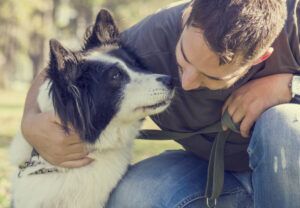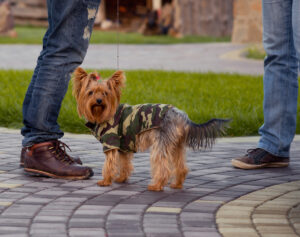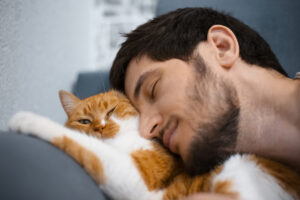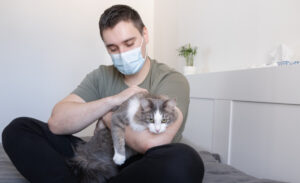 Gay Men and Pets: Challenges & Rewards
Gay Men and Pets: Challenges & Rewards
In an earlier article, I wrote about gay men seeking to satisfy their natural paternal instincts, even if they do not have children (that article is here). I wrote how gay men sometimes see their pets as their “children,” doting on them probably more than straight people do, overall, although the love for a pet from anyone can be profound.
Expounding on this, let’s discuss more about gay men and pets. There are a number of challenges, and certainly a number of rewards, that we can consider. Perhaps this will serve to validate many of your feelings, challenge some of your thinking, and provide support for the special relationship that is not only “Man’s Best Friend,” but “Gay Man’s Best Friend,” whether that’s the traditional dog, or a cat or some other kind of companion animal.
Rewards
 he rewards of pet ownership, or the more recommended term, “guardianship,” are many. When I was single for many years in Los Angeles, I lived alone, but had a cat. Just having him to “come home to” was a nice part of the day. It wasn’t the same as having a partner, but I still think it went a long way, when I was younger, for teaching me about just having “someone” else in mind that gave me a healthy sense of responsibility, especially over the long term. Later, this kind of awareness and regard for “another” became part of a relationship with a partner, and while it might be a stretch to say that having a pet was good preparation for having a partner, I actually think it was relevant. I think there might be more overlap there than it is comfortable to say. Both involve training (kidding).
he rewards of pet ownership, or the more recommended term, “guardianship,” are many. When I was single for many years in Los Angeles, I lived alone, but had a cat. Just having him to “come home to” was a nice part of the day. It wasn’t the same as having a partner, but I still think it went a long way, when I was younger, for teaching me about just having “someone” else in mind that gave me a healthy sense of responsibility, especially over the long term. Later, this kind of awareness and regard for “another” became part of a relationship with a partner, and while it might be a stretch to say that having a pet was good preparation for having a partner, I actually think it was relevant. I think there might be more overlap there than it is comfortable to say. Both involve training (kidding).
Having a pet can help a younger gay man also satisfy a certain paternal instinct, which is to take care of something and accept taking responsibility for its well-being, growth, development, comfort, and even discipline. Today, with many gay male couples or even single gay men having children through foster programs, adoption, surrogacy, etc., there are definitely gay fathers, but for so many busy gay men with big jobs and big social lives, and for other reasons, actual children aren’t right for them in their lives, so a pet (or more) can address that paternal instinct inside of us (just like mothers have) to take care of something and give it our love.
The unconditional love that we receive from a dog, cat, or other pet can be a component of our individual self-care. With our busy work lives, and so many stressors in recent times (the Covid pandemic, economic volatility, political divides, climate change, LGBT rights worldwide in seeming constant debate), the unconditional love that pets offer to their human protectors can remind us of the purity of compassion that the “big world” sometimes forgets. Being with your pet – petting, playing, cuddling, walking – can be a very cheap, quick, and effective stress reducer throughout our day, especially if we work from home, as so many people do these days.
The rewards of pets include helping us to connect to Nature, to remind us that although we have electronic gadgets and planes that circumvent the globe and Zoom and banking and rush/rush/go/go, we are still part of the same animal kingdom they come from. We are connected to Nature by having these domesticated representations of the natural world in our homes. This reminds us that, existentially, we’re only a few chromosomes or so from being in their position, and that all creatures of the world are inter-connected, when our modern society likes to pressure us into forgetting that.
Pets appeal to our better natures. Who can be angry when a dog is licking our hand? Who can be stressed out when we are throwing a ball for him/her to fetch, or dangling a string of yarn in front of a cat to attack? However “tough” gay men have to be in society to stave off homophobia, discrimination, work competition (there’s an article on that coming up that I’m working on; stay tuned!), other home/family pressures, and financial chores, we can finally relax in the company of our pet, however briefly.
The care, feeding, grooming, vet visits, supply shopping, and other things we do for our pets helps us to know a healthy discipline that gets us “outside of our own heads” and thinking of another, which is a good insurance policy against too much self-focus or self-involvement, and cultivates empathy for another (which is also a good relationship tool when having a partner).
Pets can even be a source of prestige. This is, of course, controversial, but gay men in general tend to have the stereotypical “good taste” that straight women always seem to fetishize about us. Rescue organizations and local animal shelters will always recommend adoption from them or from an online organization like Petfinder.com, or certain dog or cat breeds will have their own specialty rescue websites. But some gay men want “designer dogs” of a specific breed, and to each his own. Just like a “trophy husband” can be nice to be seen out walking with, so can an especially unusual or beautiful breed of pet. Some single gay men claim that walking their dog can be a real “dude magnet” because it’s an easy way to start conversations (although where I live, in West Hollywood, sometimes the hotter guys walk their dogs quickly away because they don’t want the flirtations!).
 Having pets gives us one more “conversational tool” in social situations. Pets are an easy topic to break the ice with someone, and when I coach gay men on how to increase their social networking skills, whether for their work, social lives, or dating lives, talking about pets can feel easy. Gay men like being asked about their beloved pets, kind of like grandparents like being asked about their grandchildren. Most people get more answer back than they anticipated! It’s not really that we are “using” our beloved pets to make friends, get a new job, or even get laid, but the socialization factor in pets can be another one of their rewards.
Having pets gives us one more “conversational tool” in social situations. Pets are an easy topic to break the ice with someone, and when I coach gay men on how to increase their social networking skills, whether for their work, social lives, or dating lives, talking about pets can feel easy. Gay men like being asked about their beloved pets, kind of like grandparents like being asked about their grandchildren. Most people get more answer back than they anticipated! It’s not really that we are “using” our beloved pets to make friends, get a new job, or even get laid, but the socialization factor in pets can be another one of their rewards.
Pets can also help us to have a sense of identity within our life span, by observing theirs. My husband of 20 years (in 2022) and I have now had three dogs and two cats, at different/staggered times, with now only our youngest dog left. But our various pets have helped us to understand our relationship in a certain context by way of our pets’ lifetimes, the circumstances of how we got them, their youth and development, what we experienced during their lifetimes, and even their aging and deaths. This helps us to cope with the developmental and existential aspects of life for all of us, eventually.
Challenges
Which brings us to the challenges of pets. Many animal welfare advocates, veterinarians, and rescue organization workers will emphasize that pet ownership/guardianship is definitely not for everyone. It takes time, money, sacrifice, and commitment of both material and non-material resources (like love and attention).
Let’s look at some of the challenges of having pets, and their cognitive and behavioral coping strategies for each one.
 Selection Process – Type of Pet, Source of that Pet – First, deciding on what kind of pet you want is key. Do your research and homework to consider the species, breed, weight, characteristics, and special requirements that vary in their care. What’s allowed in your apartment building or condo complex is also a key consideration; you don’t want to run afoul of rules that might force you to give up your pet later. Your homeowners insurance policy (if you have that) might prohibit exotic or dangerous pets, such as boa constrictors or animals that are not “approved” domesticated animals (ferrets are often prohibited, for example, or pit bulls). Plus, there’s just what you want. Do you want a “lower maintenance” cat? Do you want a docile breed of dog, or one that has a ton of energy to often play? How are they about any separation anxiety if you’re at work all day? What kind of health problems might the breed be known to have, that you need to be prepared for to pay possibly extensive vet bills?
Selection Process – Type of Pet, Source of that Pet – First, deciding on what kind of pet you want is key. Do your research and homework to consider the species, breed, weight, characteristics, and special requirements that vary in their care. What’s allowed in your apartment building or condo complex is also a key consideration; you don’t want to run afoul of rules that might force you to give up your pet later. Your homeowners insurance policy (if you have that) might prohibit exotic or dangerous pets, such as boa constrictors or animals that are not “approved” domesticated animals (ferrets are often prohibited, for example, or pit bulls). Plus, there’s just what you want. Do you want a “lower maintenance” cat? Do you want a docile breed of dog, or one that has a ton of energy to often play? How are they about any separation anxiety if you’re at work all day? What kind of health problems might the breed be known to have, that you need to be prepared for to pay possibly extensive vet bills?
Cognitive Coping Strategies – Mostly, just give your selection of pet some thought. Brainstorm why you want a pet, and some possible risks and rewards of what that might be like, before you even start your search. Think about if you’re ready to make a long-term (for the life of the animal!) commitment to its well-being. This is not a temporary thing. Think about your current schedule and lifestyle, and how that might change (do you have time to walk a dog at least several times a day? Can you afford a pet sitter to do it while you’re at work?).
Behavioral Coping Strategies – Take yourself through a series of questions beforehand, and don’t be impulsive for a “pretty face” pet or one that’s “trendy” now. Get consultation from a friend who is an animal advocate of some kind, or even just speak briefly to your local vet. Pet rescue organizations might tend to “gloss over” any challenges in order to adopt out their surplus of pets who need homes, but even they will want to make a good match. Discuss your decision to get a pet, and what kind, and how the caretaking duties will be shared, with a partner or roommate (I worked with a client on this recently, and his partner’s unilateral decision to buy a prestigious dog breed caused friction on many levels in the relationship).
 Costs – The costs associated with pet adoption can be significant. Even rescue organizations might have an adoption fee that is in the hundreds of dollars, and a purebred breeder (of the pet kind, not the slang for heterosexuals lol!) might charge thousands for one pet. The cost of spaying or neutering a new pet is key, as are initial (and follow-up) shots or other treatments like grooming, clipping claws (humanely), or cleaning ears/teeth, which are all professional veterinary or grooming services. The cost of weekly food, some toys, bedding, and possibly daily pet sitting if you’re at work or on vacation are all part of your annual budget that wasn’t there before. In general, cats cost less to care for than dogs. “Mutt dogs” can be less overall “maintenance” than certain purebreds.
Costs – The costs associated with pet adoption can be significant. Even rescue organizations might have an adoption fee that is in the hundreds of dollars, and a purebred breeder (of the pet kind, not the slang for heterosexuals lol!) might charge thousands for one pet. The cost of spaying or neutering a new pet is key, as are initial (and follow-up) shots or other treatments like grooming, clipping claws (humanely), or cleaning ears/teeth, which are all professional veterinary or grooming services. The cost of weekly food, some toys, bedding, and possibly daily pet sitting if you’re at work or on vacation are all part of your annual budget that wasn’t there before. In general, cats cost less to care for than dogs. “Mutt dogs” can be less overall “maintenance” than certain purebreds.
Cognitive Coping Strategies – Sit down and make a list of potential costs, and then compare that with your current income, expenses, and overall lifestyle budget. Are you willing to make any necessary sacrifices to afford your pet’s care? Could you meet those responsibilities without resenting your pet for costing more than you were expecting? How could you learn what costs to be prepared for (ask a vet or rescue staff)? Are you willing to perhaps live with the frustration of a cat who might claw furniture (DO NOT “de-claw”!), or a dog who pees in the wrong place before it’s fully housetrained?
Behavioral Coping Strategies – Actively budget both money and time for your pet’s care. Accept it as a part of the cost of having their companionship and unconditional love. Most people find it worth it, but you have to make that decision from an informed perspective, either alone or with your partner or roommates.
 Housing – For the right pet, consider your housing now, and what it will likely be in the future. Smaller apartments or flats might be conducive to cats, or small dogs, while larger dogs either need outdoor walks/runs frequently or a big yard.
Housing – For the right pet, consider your housing now, and what it will likely be in the future. Smaller apartments or flats might be conducive to cats, or small dogs, while larger dogs either need outdoor walks/runs frequently or a big yard.
Cognitive Coping Strategies – Think about where you live now, and where you might live in the future. Be aware of any housing rules about where you live, including if your partner or roommates have allergies, or even a phobia about certain kinds of pets that are triggering. Think about where your pet would sleep, and where it might be allowed to be, or not (in your bed, on your couch, etc.).
Behavioral Coping Strategies – Take a look at your condo Homeowners Association rules, or the text of an apartment rental lease. Make a plan for getting answered any questions that you don’t know for sure the answers to. Consider the humane aspects of your pet’s need for space, such as having a space (like a cat tree) for a cat to “escape” your dog, if you have one.
 Allergies – Pet allergies are the bane of many people’s health. Dating a new guy who has an allergy to dogs or cats can actually threaten the relationship. Allergies from roommates or friends visiting can be a consideration. This is kind of a “fact of life” and shouldn’t always prevent you from having a pet, but it’s something to be aware of.
Allergies – Pet allergies are the bane of many people’s health. Dating a new guy who has an allergy to dogs or cats can actually threaten the relationship. Allergies from roommates or friends visiting can be a consideration. This is kind of a “fact of life” and shouldn’t always prevent you from having a pet, but it’s something to be aware of.
Cognitive Coping Strategies – Think about the people you have frequent contact with, and ask, if you don’t already know, about their allergies.
Behavioral Coping Strategies – Make a plan for how you might cope with your own, or others’ allergies. Sometimes a daily medication will help, but this can be a challenging situation, especially for a boyfriend/partner/spouse situation.
 Time for Care – Gay men can be busy people. We can have high-demand, high-reward jobs that fund an active social life, travel life, and domestic lifestyle. With these big, often professional jobs, that can interfere with the time required to care for a pet.
Time for Care – Gay men can be busy people. We can have high-demand, high-reward jobs that fund an active social life, travel life, and domestic lifestyle. With these big, often professional jobs, that can interfere with the time required to care for a pet.
Cognitive Coping Strategies – Before taking in a pet, think about your current time schedule. When in your day would you walk, feed, or play with a dog, which are all necessary functions for him/her? Who would take care of your pet if you have frequent business travel, or frequent leisure travel?
Behavioral Coping Strategies – Make a “time budget” and see where “pet activities” fit into your daily and weekly schedule. If you can’t find time “on paper,” you might need to wait taking on a pet.
 Passing & Loss – By far the hardest part of enjoying that life of a pet is its end. My husband and I have now had to endure witnessing the euthanasia of two dogs and one cat, one at home with a visiting vet and another two in vet’s offices (one during the height of the pandemic, when we were dressed in almost HazMat suits!), and another cat died of natural causes in his sleep. I don’t think there have been sadder days for us. While some people find this kind of experience so emotionally trying that they avoid having a pet, or getting another pet, altogether, I still think it’s worth it. My favorite movie is “The Wizard of Oz,” and I always think of the Tin Man’s line at the end when he’s trying to say goodbye to Dorothy: “Now I know I have a heart. Cuz it’s breaking.”
Passing & Loss – By far the hardest part of enjoying that life of a pet is its end. My husband and I have now had to endure witnessing the euthanasia of two dogs and one cat, one at home with a visiting vet and another two in vet’s offices (one during the height of the pandemic, when we were dressed in almost HazMat suits!), and another cat died of natural causes in his sleep. I don’t think there have been sadder days for us. While some people find this kind of experience so emotionally trying that they avoid having a pet, or getting another pet, altogether, I still think it’s worth it. My favorite movie is “The Wizard of Oz,” and I always think of the Tin Man’s line at the end when he’s trying to say goodbye to Dorothy: “Now I know I have a heart. Cuz it’s breaking.”
Cognitive Coping Strategies – I don’t think there is any other better cognitive coping strategy for this loss other than saying to yourself, “the only way out, is through.” Let yourself grieve. It’s only natural. You loved your pet, and when they are gone, it hurts very badly. But that’s not only part of their life, but it’s part of ours, too. We all have many turns at experiencing grief, that seem to accumulate over a lifetime (one of the challenges of getting older, I think), and someday it will be others’ turn to mourn us. Accepting the “transition” as part of life helps to cope, and to know that your love for your pet gave it a hopefully healthy and happy life because of your care.
Behavioral Coping Strategies – There are many aspects to managing grief, no what the kind of loss (I’ve written other articles about grief and loss here). I think my favorite suggestion is just not to avoid it. Let it (fucking) hurt as bad as it needs to, for as long as it needs to, and it is the natural course of things that the grief will subside, even if you will always miss your pet. I actually think adopting another pet reasonably shortly can be comforting. We have to remember that for most kinds of pets, especially cats and dogs, there are many (many!) more born than homes to house them in, and this results in a terrible social situation of many animals needing to be euthanized in shelters or facilities annually. This is why spaying or neutering a pet is so crucial. There are pets who need homes now, every day, in every municipality, so the sooner you can open your home – and your heart – to a new pet after losing one, the sooner you are saving a life – and providing probably an especially good home for them.
Conclusion
 Pets can’t completely substitute for live, in-person, human-to-human interpersonal relationships, but they can be a great enhancement to life, under the right circumstances. And for gay men, we often have “special” interpersonal relationships going on in our lives, because in addition to (or, in some cases, in place of) our Family of Origin, we also have our Family of Choice, who can be our gay male peers, other ally friends, neighbors, co-workers, and others. Pets can be a part of what we clinical social workers call our Emotional Support System, which is a living thing comprised of both supportive professionals and supportive friends that we need to cultivate, manage, and incorporate into our lives, at any age or developmental stage of life.
Pets can’t completely substitute for live, in-person, human-to-human interpersonal relationships, but they can be a great enhancement to life, under the right circumstances. And for gay men, we often have “special” interpersonal relationships going on in our lives, because in addition to (or, in some cases, in place of) our Family of Origin, we also have our Family of Choice, who can be our gay male peers, other ally friends, neighbors, co-workers, and others. Pets can be a part of what we clinical social workers call our Emotional Support System, which is a living thing comprised of both supportive professionals and supportive friends that we need to cultivate, manage, and incorporate into our lives, at any age or developmental stage of life.
On a personal note, I want to dedicate this to my cat, Boris. Boris was our orange tabby cat, who died of cancer just over a week ago, after a long deterioration. He was 17, and we adopted him from a cat rescue program at our local Petco pet supply store in West Hollywood. We took our dog then, a miniature Dachshund, with us, and showed her the kittens available for adoption. When we picked up Boris from the pen, the dog didn’t seem to flinch, and Boris just kind of sniffed at our dog, but didn’t hiss or get upset. Just then, we knew he was the one for us. Later, Boris made a habit of walking up to the dog and grooming her face with his tongue, in a sweet show of dog/cat affection that doesn’t happen with all of them. While it was painful to have to bring Boris to our vet for the procedure, we knew it was the right thing to do, to avoid him being in pain or suffering from his mental and physical decline. But it’s the good times we will remember, such as his penchant for always sitting and sleeping underneath the Christmas tree every year. And, when the time is right, we will get another cat.
In tribute, I played the cast album of “Cats” in his honor, especially its finale about “up to the Heaviside Layer” (kitty heaven) and the respect involved in addressing a cat (the video excerpt from the stage production (complete with awesome costumes/makeup) for that is here: https://youtu.be/0UaVMk4hXGo, and if you want the original text, read by T.S. Eliot (the author of the poem), that’s here (https://www.themarginalian.org/2013/06/04/t-s-eliot-reads-t-s-eliot-the-ad-dressing-of-cats-1947/).
Who do you want to honor today, as a pet, either current or past? How does that make you feel? Knowing your feelings about your pet, helps you to know your feelings about yourself, and can make you feel just “alive.”
If you need support for something around the topic of pets, please consider having therapy (for clients in California, where I’m licensed) or coaching (for those who live outside of California, or in other countries). I’d be happy to help.
Call or text 310-339-5778, or email Ken@GayTherapyLA.com, for more information, or to make an appointment. And, please tell your friends about my blog (and podcast) if you think they could benefit from this material.

Ken Howard, LCSW, CST, has been a gay men’s specialist psychotherapist for over 30 years. He is a Licensed Clinical Social Worker in California, AASECT Certified Sex Therapist, Life/Career/Relationship Coach, academic, activist, and LGBTQ+ advocate. He also offers speaking engagements, and expert witness services on LGBT and HIV/AIDS issues. He is a Certified Psychiatric Social Worker, and has an additional Certification in Consensual Non-Monogamy and Polyamorous Relationships from the Sexual Health Alliance. He has been successfully living with HIV/AIDS since 1990. He lives in West Hollywood, California with his husband and pets.


 Selection Process – Type of Pet, Source of that Pet – First, deciding on what kind of pet you want is key. Do your research and homework to consider the species, breed, weight, characteristics, and special requirements that vary in their care. What’s allowed in your apartment building or condo complex is also a key consideration; you don’t want to run afoul of rules that might force you to give up your pet later. Your homeowners insurance policy (if you have that) might prohibit exotic or dangerous pets, such as boa constrictors or animals that are not “approved” domesticated animals (ferrets are often prohibited, for example, or pit bulls). Plus, there’s just what you want. Do you want a “lower maintenance” cat? Do you want a docile breed of dog, or one that has a ton of energy to often play? How are they about any separation anxiety if you’re at work all day? What kind of health problems might the breed be known to have, that you need to be prepared for to pay possibly extensive vet bills?
Selection Process – Type of Pet, Source of that Pet – First, deciding on what kind of pet you want is key. Do your research and homework to consider the species, breed, weight, characteristics, and special requirements that vary in their care. What’s allowed in your apartment building or condo complex is also a key consideration; you don’t want to run afoul of rules that might force you to give up your pet later. Your homeowners insurance policy (if you have that) might prohibit exotic or dangerous pets, such as boa constrictors or animals that are not “approved” domesticated animals (ferrets are often prohibited, for example, or pit bulls). Plus, there’s just what you want. Do you want a “lower maintenance” cat? Do you want a docile breed of dog, or one that has a ton of energy to often play? How are they about any separation anxiety if you’re at work all day? What kind of health problems might the breed be known to have, that you need to be prepared for to pay possibly extensive vet bills? Costs – The costs associated with pet adoption can be significant. Even rescue organizations might have an adoption fee that is in the hundreds of dollars, and a purebred breeder (of the pet kind, not the slang for heterosexuals lol!) might charge thousands for one pet. The cost of spaying or neutering a new pet is key, as are initial (and follow-up) shots or other treatments like grooming, clipping claws (humanely), or cleaning ears/teeth, which are all professional veterinary or grooming services. The cost of weekly food, some toys, bedding, and possibly daily pet sitting if you’re at work or on vacation are all part of your annual budget that wasn’t there before. In general, cats cost less to care for than dogs. “Mutt dogs” can be less overall “maintenance” than certain purebreds.
Costs – The costs associated with pet adoption can be significant. Even rescue organizations might have an adoption fee that is in the hundreds of dollars, and a purebred breeder (of the pet kind, not the slang for heterosexuals lol!) might charge thousands for one pet. The cost of spaying or neutering a new pet is key, as are initial (and follow-up) shots or other treatments like grooming, clipping claws (humanely), or cleaning ears/teeth, which are all professional veterinary or grooming services. The cost of weekly food, some toys, bedding, and possibly daily pet sitting if you’re at work or on vacation are all part of your annual budget that wasn’t there before. In general, cats cost less to care for than dogs. “Mutt dogs” can be less overall “maintenance” than certain purebreds. Housing – For the right pet, consider your housing now, and what it will likely be in the future. Smaller apartments or flats might be conducive to cats, or small dogs, while larger dogs either need outdoor walks/runs frequently or a big yard.
Housing – For the right pet, consider your housing now, and what it will likely be in the future. Smaller apartments or flats might be conducive to cats, or small dogs, while larger dogs either need outdoor walks/runs frequently or a big yard. Allergies – Pet allergies are the bane of many people’s health. Dating a new guy who has an allergy to dogs or cats can actually threaten the relationship. Allergies from roommates or friends visiting can be a consideration. This is kind of a “fact of life” and shouldn’t always prevent you from having a pet, but it’s something to be aware of.
Allergies – Pet allergies are the bane of many people’s health. Dating a new guy who has an allergy to dogs or cats can actually threaten the relationship. Allergies from roommates or friends visiting can be a consideration. This is kind of a “fact of life” and shouldn’t always prevent you from having a pet, but it’s something to be aware of. Time for Care – Gay men can be busy people. We can have high-demand, high-reward jobs that fund an active social life, travel life, and domestic lifestyle. With these big, often professional jobs, that can interfere with the time required to care for a pet.
Time for Care – Gay men can be busy people. We can have high-demand, high-reward jobs that fund an active social life, travel life, and domestic lifestyle. With these big, often professional jobs, that can interfere with the time required to care for a pet.  Passing & Loss – By far the hardest part of enjoying that life of a pet is its end. My husband and I have now had to endure witnessing the euthanasia of two dogs and one cat, one at home with a visiting vet and another two in vet’s offices (one during the height of the pandemic, when we were dressed in almost HazMat suits!), and another cat died of natural causes in his sleep. I don’t think there have been sadder days for us. While some people find this kind of experience so emotionally trying that they avoid having a pet, or getting another pet, altogether, I still think it’s worth it. My favorite movie is “The Wizard of Oz,” and I always think of the Tin Man’s line at the end when he’s trying to say goodbye to Dorothy: “Now I know I have a heart. Cuz it’s breaking.”
Passing & Loss – By far the hardest part of enjoying that life of a pet is its end. My husband and I have now had to endure witnessing the euthanasia of two dogs and one cat, one at home with a visiting vet and another two in vet’s offices (one during the height of the pandemic, when we were dressed in almost HazMat suits!), and another cat died of natural causes in his sleep. I don’t think there have been sadder days for us. While some people find this kind of experience so emotionally trying that they avoid having a pet, or getting another pet, altogether, I still think it’s worth it. My favorite movie is “The Wizard of Oz,” and I always think of the Tin Man’s line at the end when he’s trying to say goodbye to Dorothy: “Now I know I have a heart. Cuz it’s breaking.”